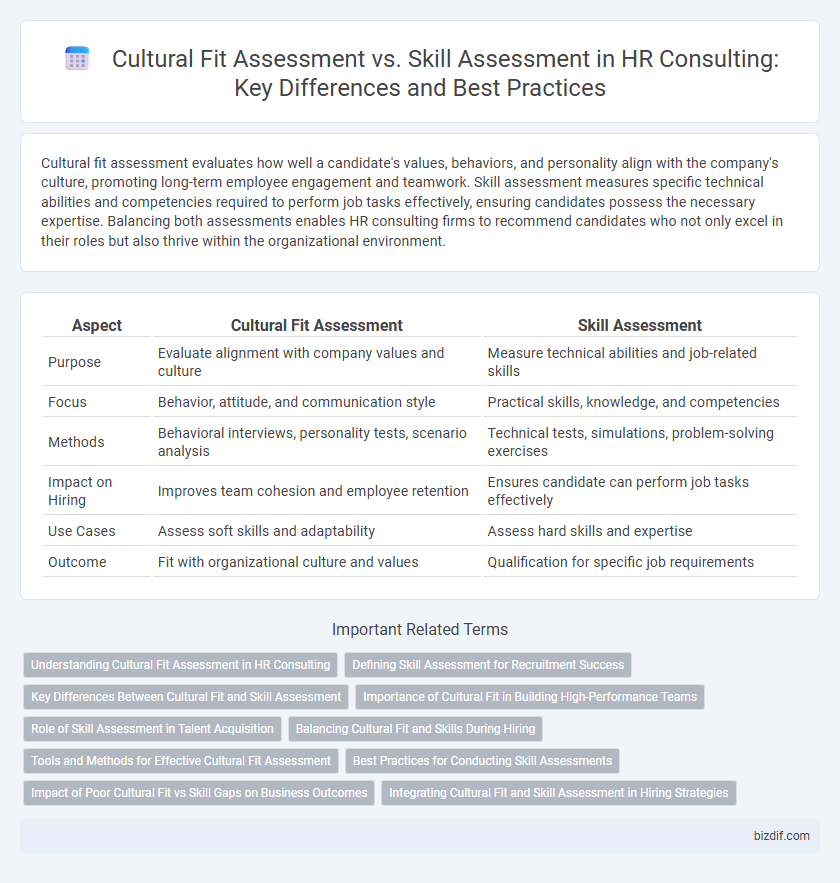Cultural fit assessment evaluates how well a candidate's values, behaviors, and personality align with the company's culture, promoting long-term employee engagement and teamwork. Skill assessment measures specific technical abilities and competencies required to perform job tasks effectively, ensuring candidates possess the necessary expertise. Balancing both assessments enables HR consulting firms to recommend candidates who not only excel in their roles but also thrive within the organizational environment.
Table of Comparison
| Aspect | Cultural Fit Assessment | Skill Assessment |
|---|---|---|
| Purpose | Evaluate alignment with company values and culture | Measure technical abilities and job-related skills |
| Focus | Behavior, attitude, and communication style | Practical skills, knowledge, and competencies |
| Methods | Behavioral interviews, personality tests, scenario analysis | Technical tests, simulations, problem-solving exercises |
| Impact on Hiring | Improves team cohesion and employee retention | Ensures candidate can perform job tasks effectively |
| Use Cases | Assess soft skills and adaptability | Assess hard skills and expertise |
| Outcome | Fit with organizational culture and values | Qualification for specific job requirements |
Understanding Cultural Fit Assessment in HR Consulting
Cultural Fit Assessment in HR consulting evaluates how well a candidate's values, beliefs, and behaviors align with the organization's culture, promoting long-term employee engagement and retention. Unlike skill assessments that measure technical abilities and job-specific competencies, cultural fit assessments focus on personality traits, work style, and interpersonal compatibility with team dynamics. This approach helps HR consultants recommend candidates who not only excel in their roles but also contribute positively to company morale and collaborative environments.
Defining Skill Assessment for Recruitment Success
Skill assessment in HR consulting involves evaluating candidates' technical abilities, problem-solving skills, and job-specific competencies to ensure recruitment success. This process utilizes standardized tests, practical exercises, and simulations to measure proficiency and predict on-the-job performance accurately. Prioritizing skill assessment enhances hiring decisions by aligning candidate capabilities with role requirements, reducing turnover, and improving overall organizational effectiveness.
Key Differences Between Cultural Fit and Skill Assessment
Cultural Fit Assessment evaluates how well a candidate's values, beliefs, and behaviors align with an organization's culture, impacting employee retention and team cohesion. Skill Assessment measures specific technical abilities and competencies required for job performance, directly affecting productivity and job success. Understanding these distinctions helps HR professionals tailor recruitment strategies to balance cultural alignment with necessary skills for optimal workforce integration.
Importance of Cultural Fit in Building High-Performance Teams
Cultural fit assessment evaluates alignment between a candidate's values, behaviors, and organizational culture, which is critical for fostering collaboration and long-term engagement in high-performance teams. While skill assessment measures technical competence and job-specific abilities, prioritizing cultural fit enhances team cohesion, reduces turnover, and drives collective success. Organizations that integrate cultural fit into hiring processes experience improved employee satisfaction and sustained productivity, essential factors for competitive advantage.
Role of Skill Assessment in Talent Acquisition
Skill assessment plays a critical role in talent acquisition by objectively evaluating candidates' technical expertise and job-specific competencies, ensuring alignment with organizational requirements. Unlike cultural fit assessment, which gauges behavioral compatibility and company values alignment, skill assessments provide quantifiable metrics to predict job performance and reduce hiring risks. Integrating robust skill evaluations streamlines recruitment, enhances candidate selection accuracy, and supports data-driven hiring decisions in HR consulting.
Balancing Cultural Fit and Skills During Hiring
Balancing cultural fit and skills during hiring ensures both effective team dynamics and job performance. Cultural fit assessments evaluate alignment with organizational values, improving employee retention and collaboration. Simultaneously, skill assessments verify technical competencies, enabling hires that meet role-specific requirements and drive productivity.
Tools and Methods for Effective Cultural Fit Assessment
Effective cultural fit assessment relies on tools like personality inventories, behavioral interviews, and workplace simulations designed to evaluate alignment with organizational values and team dynamics. Methods such as structured cultural fit questionnaires and values-based situational judgment tests provide insights into candidates' adaptability and interpersonal compatibility. Leveraging psychometric assessments alongside real-world scenario analysis enhances the precision of cultural fit evaluation, ensuring better employee retention and engagement.
Best Practices for Conducting Skill Assessments
Effective skill assessments in HR consulting focus on creating job-relevant tests that accurately measure candidates' abilities and practical knowledge. Best practices include using standardized evaluation criteria, incorporating simulations or real-world tasks, and ensuring assessments are fair, unbiased, and aligned with organizational goals. Regularly updating assessment tools based on industry trends and feedback enhances their predictive validity and overall hiring success.
Impact of Poor Cultural Fit vs Skill Gaps on Business Outcomes
Poor cultural fit often leads to decreased employee engagement, higher turnover rates, and disrupted team dynamics, directly harming organizational productivity and morale. In contrast, skill gaps primarily result in reduced task efficiency and project delays but can often be addressed through targeted training and development programs. Businesses experiencing both poor cultural alignment and skill deficiencies face compounded negative effects, including increased costs and diminished competitive advantage.
Integrating Cultural Fit and Skill Assessment in Hiring Strategies
Integrating cultural fit assessment with skill assessment in hiring strategies ensures a holistic evaluation of candidates, aligning both technical competencies and organizational values. Leveraging behavioral interviews and psychometric tests alongside technical evaluations enhances predictive accuracy for job performance and employee retention. This combined approach reduces turnover costs and strengthens team cohesion by selecting candidates who excel professionally and resonate culturally.
Cultural Fit Assessment vs Skill Assessment Infographic

 bizdif.com
bizdif.com